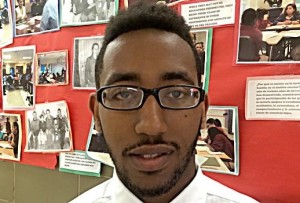Ethiopian Immigrant Plans To Join The Peace Corps, Awarded Gates Millennial Scholarship
African Immigration Trend Has A Strong Base In D.C. Area
WAMU 88.5
By: Armando Trull
May 20, 2015
Over the past 40 years, the number of black immigrants coming to the United States has quadrupled. The majority of them have arrived from Jamaica and Haiti, but now the origin countries are changing. Africa is now represented more than ever before.
The new trend has already taken hold in D.C., where African immigrants have accounted for much of the growth in the region’s black immigration, says Mark Hugo Lopez, research director at the Pew Research Center, which recently released a study on the data.
“The growth in the number of African immigrants, black African immigrants has really been the driver in the growth of the black immigrant population overall, which now stands at 3.8 million,” Lopez says.
In the D.C. region almost 15 percent of blacks are foreign born – that’s close to a quarter million people – and many are from African nations such as Nigeria and especially Ethiopia.
Abreham Gebre, 18, is among the 50,000 Ethiopians living in our region.

Gebre, who came to the U.S. from Ethiopia as a child with his family, attends Bell Multicultural High School in Northwest D.C.
“When I was four years old I came here to the United States with my mom and my dad and my twin sister,” he says. His father won the State Department’s diversity visa lottery, which every year grants 50,000 green cards to immigrants from countries with low migration to the United States.
Pew estimates that many of the recently arrived African immigrants either come through the diversity visa lottery, via a family sponsorship or as refugees.
“My parents came to the U.S. in hopes of giving their children the education they were never able to receive themselves,” Gebre says.
Pew also found that many of the recent African emigres are highly educated, “many of whom have a college degree, many of them have an advanced degree,” Lopez says.
A study last year by the Migration Policy Institute found that 39 percent of these African immigrants are underemployed, unable to validate professional degrees from their countries. Many – as is the case of Abraham’s parents – have to take whatever job is available to support their families.
“So in Addis Ababa my dad was a teacher, he taught at a university. [And now] he’s a special police officer. He’s security working at an office building,” Gebre says. His mother works at a Dunkin’ Donuts and also cleans office buildings.
Nevertheless, some Ethiopians and other Africans have done well in the metro D.C. region, where you can find many thriving African restaurants and businesses.
Gebre is on his way to success, too: He was awarded a Gates Millennial Scholarship, which means all of the expenses for his entire college career – from bachelor’s to doctorate – will be paid for. He says his parents were astounded.
“My parents never expected they receive any of this. They just hoped to bring their kids to the country of freedom, as America is,” he says.
Until now Gebre had been working part time at a CVS pharmacy. He says he’ll give his earnings to his sister to help pay for her college education. He plans to study international relations, computer science and join the Peace Corps.
No comments yet.
Add your comment